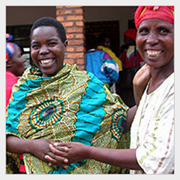
Historically speaking, women have been left out of the most important conversations regarding war and peace until fairly recently. (Only 17 percent of the seats in the US Congress are held by women - and that's the most it's ever been.) As more women are coming into positions of power around the world, I believe there is the strong potential that future conversations on the topic will be different. Instead of the focus being on, "How do we gain power over a nation?" I think the conversations will more likely focus on, "How do we gain power with a nation?"
Jean Shinoda Bolen, M.D., former clinical professor of psychiatry at the University of California at San Francisco, has said:
"Women as a gender have an ability to physiologically be the more empathic gender. It has to do with when stress occurs. Men as a gender go to 'fight or flight,' and ever since the research was done at UCLA in 1991, we know that women tend, when stressed, to want to talk to other women closest to them, and that when they do, the stress level goes down, and the maternal bonding hormone -- oxytocin -- goes up." She concludes: "Essentially if there is ever going to be a peace negotiated well in this world, women have to be at the table."
Some would disagree with the thesis that women are better peacemakers than men. In fact, I have been challenged on this subject by several men who insist that women are more jealous than men, bear grudges longer, and can be "vicious psychological warriors" -- meaning they have long memories for perceived slights and don't give up a fight. One male friend said: "Women are more territorial than men, particularly when it comes to protecting their children. I mean, look at a New York mom trying to get her kid into preschool. She'll kill to do that!"
While I agree that women, like men, are competitive and have a strong warrior spirit, I do think there is a difference in how those characteristics get played out. As brought out by the research project mentioned above it seems that men go to "fight or fight" and women talk. For example, in 1994 in Rwanda, 800,000 people were massacred. There were orphanages filled with children. Women got together to talk about how to reconcile the situation. They decided that they needed to adopt these orphaned children whether they were Tutsi or Hutu -- in other words, no matter what side they were on. Women played a pivotal role in reconstructing Rwanda. And in that country, they now make up the largest percentage of women in government leadership compared to anywhere else in the world -- 56 percent in the parliament and one third of all the cabinet positions including foreign minister, education minister, Supreme Court chief and police commissioner general.
For example, in 1994 in Rwanda, 800,000 people were massacred. There were orphanages filled with children. Women got together to talk about how to reconcile the situation. They decided that they needed to adopt these orphaned children whether they were Tutsi or Hutu -- in other words, no matter what side they were on. Women played a pivotal role in reconstructing Rwanda. And in that country, they now make up the largest percentage of women in government leadership compared to anywhere else in the world -- 56 percent in the parliament and one third of all the cabinet positions including foreign minister, education minister, Supreme Court chief and police commissioner general.
And what about a woman's ability to hold a grudge? How does that contribute to peace? Some may think it doesn't -- at least not directly -- but things get interesting when we examine this grudge-holding ability. One explanation for it comes from Christiane Northrup, M.D., women's health expert and author of Women's Bodies, Women's Wisdom: "Men compartmentalize their feelings, but women remember everything," she says. Research has also shown us that women's brains are more wired for communication and interconnection.
This could mean there's a greater capacity for empathy in women as compared to men. Although holding a grudge isn't a good thing, seeing things long-term and as interrelated can be positive traits for peacemaking. When we can see the bigger picture, we see that every child is in fact our child. As a result, the borders of fear and hatred dissolve, and we move toward power with all nations.
"We have been training for this job all our lives, negotiating home and community with empathy and a willingness to compromise," says Marie Wilson, Founder of The White House Project, a non-profit organization that aims to advance women's leadership.
I think it's important to mention that I am not promoting the idea that men are the war-makers and women are the peacemakers and that men should cede their power so women can be the leaders and rule the world. Frankly, I think anyone who is thinking along those lines is repeating a non-supportive divisive pattern. I am suggesting that with more women at the table of diplomatic, economic, and political leadership -- who take with them their natural feminine strengths of compassion, empathy, and unconditional love - we will see some great changes taking place.
